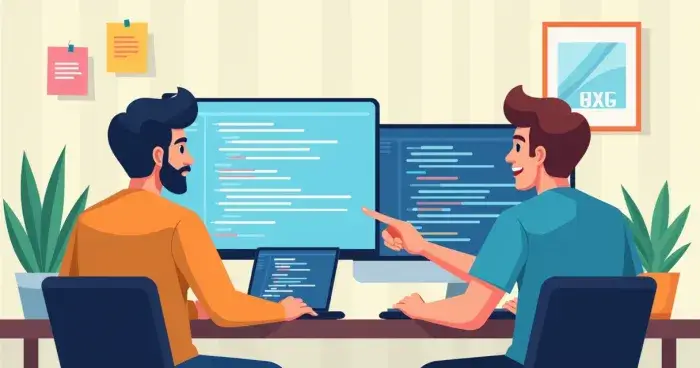TechBit Daily Programming Wisdom and Insights
Some mornings, I grab my coffee, breathe in the ever-familiar aroma, and sit at my screen with both excitement and a hint of worry. Programming brings both, doesn’t it? Each day, lines of code bring small discoveries and a few, sometimes laughable, missteps. I thought I’d share a bit from the day-to-day—a bit of the wisdom that sneaks up when you least expect it, the kind that rarely comes from any official manual.
Small habits shape great code.
Big ideas, tiny steps
There’s something people who don’t code never truly see: progress is rarely fast or glamorous. Most of the wisdom I’ve collected has nothing to do with fancy frameworks, or the latest language everyone’s hyping about. It’s in how you bite off a problem, one chunk at a time.
- Break big tasks into smaller, more friendly pieces.
- Write down what you want the code to do—just plain language.
- Don’t expect to be right the first time. Mistakes are fine—expected, even.
I recall a day early in my career when I wrestled with nested loops—nothing worked, no matter what. Finally, a mentor told me to scribble my thinking on paper, breaking the logic into little pieces. That changed everything. It’s still the trick I use today when logic gets tangled.
The bug, your patient teacher

Bugs. Annoying, yes, but strangely kind teachers if you let them be. The secret most experienced programmers share is that they still bump into bugs almost daily. What changes is their reaction. You start learning to be a bit curious.
A bug isn’t the enemy. It’s a note from your code, asking for attention.
Some days, a stray comma will jade your mood. Maybe you’ll waste a whole afternoon tracing a typo. Frustrating? Certainly. Useful? Absolutely.
- Take a break when you get stuck. Your mind solves things better after a pause.
- Read the error message slowly—there’s almost always a hint inside.
- Explain your problem aloud, even if it’s just to an empty room. This actually helps.
Ever tried explaining a deeply stubborn bug to a colleague, only to spot the mistake as you talk? There’s even a name for this: the rubber-duck method. It sounds silly, but it works more often than not.
The joy of not knowing
Every programmer, from beginner to grizzled expert, faces something new every day. That never changes. Some see the “unknown” as intimidating, but it’s honestly the fun part. Here’s where you get to play detective.
You won’t know everything. That’s not the goal.
I sometimes write code and, as I do, admit—“I’m not totally sure how this part works.” But then, that honesty opens doors to learning. Stack Overflow tabs multiply. Docs are scanned. Sometimes, I ask for help. The trick is not to hide confusion. If anything, it might show you care.
Balance: speed and steadiness
Some teams want things fast. Cut corners here, push features out, ask questions later. Others move at a pace so slow it hurts. Finding the middle ground is its own art. If you rush too much, bugs become old friends. If you move like a glacier, the world moves past you.
So what works? Well, perhaps something like this:
- Keep code simple unless there’s a good reason to get fancy.
- Review code with at least one set of fresh eyes. Perspectives matter.
- Document odd decisions. Your future self will thank you.
I once witnessed a project delayed because a shortcut taken early came back to haunt six months later. Cutting corners can be a gamble. Sometimes you only know how risky years down the line. That’s both the fun and the fear of building things that last.
Tools change, habits stay
You’ll see new tools arrive almost daily—new editors, libraries, even entire languages. It’s easy to feel tempted, as if every piece of shiny tech is about to rewrite the rulebook. But after a while, you see which habits stick, and which ones are just noise.
Most lasting wisdom sounds unremarkable at first. Here are a few habits I wish I’d learned sooner:
- Commit your code often. Small updates are easier to understand, easier to correct.
- Back things up. Belts and suspenders both help keep pants up, after all.
- Read other people’s code, not just your own. It’s like learning a new dialect every time.
- Automate tasks that bore you. But don’t automate what you don’t fully understand.
The landscape may shift, but most wisdom doesn’t. Every tool becomes easier if you treat your code, and your time, with care. Sometimes, it’s as simple as tidying up stray files at the end of the week or adding one line of comment where it’s needed most.
Working with others

Coding can be lonely. Yet, almost all progress happens with other people. Whether it’s brainstorming, reviewing, or just listening to someone rant about a bug—these moments matter.
- Ask questions sooner, not later. Silence makes problems bigger.
- Respect different approaches. There’s usually more than one right way.
- Share wins. But don’t be shy about sharing struggles, either.
One of my favorite moments in any day is when someone says, “Wait, how did you do that?” Not because I did anything special, but because it means someone else noticed a small spark of insight. In those moments, the team itself grows stronger, sometimes even more than the code.
Embracing imperfection
The truth is, there’s no end point. No ultimate perfect system, no bug-free program, no universal way to code. That’s fine—at least, I think it is. Code will always reflect its makers: a mix of intention, limitation, creativity, and plain old oversight.
All code is a work in progress.
Some bugs will slip past. Some features will never be finished. The only real mistake, I think, is pretending otherwise. A bit of patience, a small laugh at your own expense, and the will to try again tomorrow—these are as real as any programming language.
Ending, but not finishing
I suppose, if there’s a final message tucked away in all these lessons, it’s that programming—as a set of habits and small triumphs—never really wraps up. Each day brings a chance to learn, teach, or even make a mess and fix it. If you write code, you’re already part of a quiet tradition. And that, honestly, is reason enough to keep at it.
Progress isn’t just lines of code. It’s showing up, curious, every single day.
